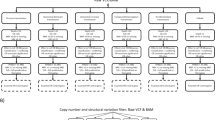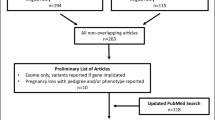Abstract
Purpose
To identify novel genetic variants responsible for meiotic embryonic aneuploidy.
Methods
A prospective observational cohort study that included 29 couples who underwent trophectoderm biopsies from 127 embryos and performed whole-exome sequencing (WES) between November 2019 and March 2022. Patients were divided into two groups according to the expected embryo aneuploidy rate based on maternal age.
Results
After variant filtering in the WES analysis of 58 patients/donors, five heterozygous variants were identified in female partners from the study group that had an impact on embryo aneuploidy. Additionally, a slowdown in embryo development and a decrease in the number of blastocysts available for biopsy were observed in the study group embryos.
Conclusion
This study has identified new candidate genes and variants not previously associated with meiotic embryo aneuploidy, but which are involved in important biological processes related to cell division and chromosome segregation. WES may be an efficient tool to identify patients with a higher-than-expected risk of embryo aneuploidy based on maternal age and allow for individualized genetic counselling prior to treatment.
Similar content being viewed by others
References
Nabhan AF, Mburu G, Elshafeey F, Magdi R, Kamel M, Elshebiny M, et al. Women’s reproductive span: a systematic scoping review. Hum Reprod Open. 2022;11:1–19.
Broekmans FJ, Soules MR, Fauser BC. Ovarian aging: mechanisms and clinical consequences. Endocr Rev. 2009;30:465–93.
Wartosch L, Schindler K, Schuh M, Gruhn JR, Hoffmann ER, McCoy RC, et al. Origins and mechanisms leading to aneuploidy in human eggs. Prenat Diagn. 2021;41(5):620–30.
Cai Y, Ding M, Zhang Y, Sun Y, Lin F, Diao Z, et al. A mathematical model for predicting the number of transferable blastocysts in next-generation sequencing-based preimplantation genetic testing. Arch Gynecol Obstet. 2022;305:241–9.
Biswas L, Tyc K, El Yakoubi W, Morgan K, Xing J, Schindler K. Meiosis interrupted: the genetics of female infertility via meiotic failure. Reproduction. 2021;161(2):R13–35.
Bell AD, Mello CJ, Nemesh J, Brumbaugh SA, Wysoker A, McCarroll SA. Insights into variation in meiosis from 31,228 human sperm genomes. Nature. 2020;583(7815):259–64.
Griswold MD. Spermatogenesis: the commitment to meiosis. Physiol Rev. 2016;96:1–17.
El Yakoubi W, Wassmann K. Meiotic divisions: no place for gender equality. Adv Exp Med Biol. 2017;1002:1–17.
Xie C, Wang W, Tu C, Meng L, Lu G, Lin G, et al. Meiotic recombination: insights into its mechanisms and its role in human reproduction with a special focus on non-obstructive azoospermia. Hum Reprod Update. 2022;28(6):763–97.
Normand EA, Alaimo JT, Van den Veyver IB. Exome and genome sequencing in reproductive medicine. Fertil Steril. 2018;109(2):213–20.
ACMG Board of Directors. Points to consider in the clinical application of genomic sequencing. Genet Med. 2012;14:759–61.
Robay A, Abbasi S, Akil A, El-Bardisi H, Arafa M, Crystal RG, et al. A systematic review on the genetics of male infertility in the era of next-generation sequencing. Arab J Urol. 2018;16(1):53–64.
Morales R, Lledo B, Ortiz JA, Lozano FM, Garcia EM, Bernabeu A, et al. Identification of new variants and candidate genes in women with familial premature ovarian insufficiency using whole-exome sequencing. J Assist Reprod Genet. 2022. https://doi.org/10.1007/s10815-022-02629-3.
McCoy RC, Demko Z, Ryan A, Banjevic M, Hill M, Sigurjonsson S, et al. Common variants spanning PLK4 are associated with mitotic-origin aneuploidy in human embryos. Science. 2015;348(6231):235–8.
Nguyen AL, Marin D, Zhou A, Gentilello AS, Smoak EM, Cao Z, et al. Identification and characterization of Aurora kinase B and C variants associated with maternal aneuploidy. Mol Hum Reprod. 2017;23(6):406–16.
Tyc KM, El Yakoubi W, Bag A, Landis J, Zhan Y, Treff NR, Scott RT, et al. Exome sequencing links CEP120 mutation to maternally derived aneuploid conception risk. Hum Reprod. 2020;35(9):2134–48.
Sun S, Miller M, Wang Y, Tyc KM, Cao X, Scott RT, et al. Predicting embryonic aneuploidy rate in IVF patients using whole-exome sequencing. Hum Genet. 2022;141(10):1615–27.
Richards S, Aziz N, Bale S, Bick D, Das S, Gastier-Foster J, et al. Standards and guidelines for the interpretation of sequence variants: a joint consensus recommendation of the American College of Medical Genetics and Genomics and the Association for Molecular Pathology. Genet Med. 2015;17(5):405–24. https://doi.org/10.1038/gim.2015.30.
Houge G, Laner A, Cirak S, de Leeuw N, Scheffer H, den JT. Stepwise ABC system for classification of any type of genetic variant. Eur J Hum Genet. 2022;30:150–9. https://doi.org/10.1038/s41431-021-00903-z.
Hassold T, Hunt P. To err (meiotically) is human: the genesis of human aneuploidy. Nat Rev Genet. 2001;2:280–91.
Fragouli E, Alfarawati S, Spath K, Jaroudi S, Sarasa J, Enciso M, et al. The origin and impact of embryonic aneuploidy. Hum Genet. 2013;132(9):1001–13.
Alazami AM, Awad SM, Coskun S, Al-Hassan S, Hijazi H, Abdulwahab FM, et al. TLE6 mutation causes the earliest known human embryonic lethality. Genome Biol. 2015;16:240.
McCoy RC, Demko ZP, Ryan A, Banjevic M, Hill M, Sigurjonsson S, et al. Evidence of selection against complex mitotic-origin aneuploidy during preimplantation development. PLoS Genet. 2015;11(10):e1005601.
Bebbere D, Masala L, Albertini DF, Ledda S. The subcortical maternal complex: multiple functions for one biological structure? J Assist Reprod Genet. 2016;33(11):1431–8.
Sladky V, Schuler F, Fava LL, Villunger A. The resurrection of the PIDDosome - emerging roles in the DNA-damage response and centrosome surveillance. J Cell Sci. 2017;130(22):3779–87.
Bohers E, Sarafan-Vasseur N, Drouet A, Paresy M, Latouche JB, Flaman JM, et al. Gradual reduction of BUBR1 protein levels results in premature sister-chromatid separation then in aneuploidy. Hum Genet. 2008;124(5):473–8.
Tomasini R, Mak TW, Melino G. The impact of p53 and p73 on aneuploidy and cancer. Trends Cell Biol. 2008;18(5):244–52.
Weaver BA, Silk AD, Montagna C, Verdier-Pinard P, Cleveland DW. Aneuploidy acts both oncogenically and as a tumor suppressor. Cancer Cell. 2007;11(1):25–36.
Balboula AZ, Schindler K. Selective disruption of aurora C kinase reveals distinct functions from aurora B kinase during meiosis in mouse oocytes. PLoS Genet. 2014;10(2):e1004194.
Schindler K, Davydenko O, Fram B, Lampson MA, Schultz RM. Maternally recruited Aurora C kinase is more stable than Aurora B to support mouse oocyte maturation and early development. Proc Natl Acad Sci USA. 2012;109(33):E2215–22.
de Castro CML, Pereira COB, Aprigio J, Costa Lima MA, Ribeiro MG, Amorim MR. Aurora kinase genetic polymorphisms: an association study in Down syndrome and spontaneous abortion. Hum Cell. 2022;35(3):849–55.
Author information
Authors and Affiliations
Corresponding author
Ethics declarations
Ethical approval
This prospective study involving human participants was in accordance with the ethical standards of the institutional and national research committee and with the 1964 Helsinki Declaration and its later amendments or comparable ethical standards. The IRB of Instituto Bernabeu approved this study.
Conflict of interest
The authors have no competing interests to declare that are relevant to the content of this article.
Additional information
Publisher’s note
Springer Nature remains neutral with regard to jurisdictional claims in published maps and institutional affiliations.
Rights and permissions
Springer Nature or its licensor (e.g. a society or other partner) holds exclusive rights to this article under a publishing agreement with the author(s) or other rightsholder(s); author self-archiving of the accepted manuscript version of this article is solely governed by the terms of such publishing agreement and applicable law.
About this article
Cite this article
Lledo, B., Marco, A., Morales, R. et al. Identification of novel candidate genes associated with meiotic aneuploidy in human embryos by whole-exome sequencing. J Assist Reprod Genet 40, 1755–1763 (2023). https://doi.org/10.1007/s10815-023-02825-9
Received:
Accepted:
Published:
Issue Date:
DOI: https://doi.org/10.1007/s10815-023-02825-9




